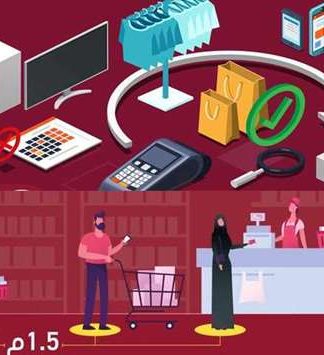The viral dating trends of 2023: Which ones could help you – and the ones you should avoid
Sky News looks back at the online dating trends of this year – and speaks to psychologists about whether any of them hold the key to finding true love.
Lara Keay
News reporter @LaraKeay
Monday 25 December 2023 18:28, UK
Why you can trust Sky News
In 2023, the search for true love has been playing out once more on social media.
Singles and couples have taken inspiration from their favourite artists, Netflix documentaries and smartphone apps to help determine if the person they are dating or in a relationship with is really the one for them – and posting about it online.
While some of this year’s online dating trends are reincarnations of age-old theories on romance, fate and chivalry, others we’ve never seen before – and are just plain bizarre.
Here we take a look at some of them – and ask experts if any could actually prove helpful in the hunt for a soulmate.
Dating wrapped 2023
As December rolled around, people relished in sharing their ‘Spotify wrapped 2023’, whereby the streaming app reveals which artists, songs, genres and podcasts users listened to the most over the past 12 months.
But this year, more and more singles have taken to social media to share their “dating unwrapped”.
Most often in the form of a PowerPoint presentation, the trend sees people break down their dating experiences over the course of the year in various metrics.
These include how they met the other person, how long the relationship lasted, who ended it and how, and where the dates took place.
On TikTok, the hashtag has 116.2 million posts.
The most watched, ‘Tara’s dating wrapped’, with 11.7 million views, says she was so committed to “the cause” of producing her dating wrapped that she forced herself to go on at least one date every month.
She shares that she managed to get stood up by the same man twice and that she only liked three out of the 14 people she dated, which included some “returning characters” she was involved with in previous years.
Is it helpful? Yes
Professor Mark Coulson is professor in psychology at the University of West London, with research interests in relationships, emotional communication and online behaviour.
He says that the end of the calendar year often offers people an opportunity for reflection, which in general psychological terms is “very healthy”.
“One of the nice things about some of our digital platforms is they give you a structure for digital journalling.
“We’re not designed to recall facts and our memories are not particularly good, so being reminded of these things can be quite nice.
“Recording your experiences – either positive or traumatic – has a proven beneficial effect.”
Read more from Sky News:
‘Luxurious greenhouse’ named house of 2023
Emojis must be more diverse, scientists warn
AI concerns over elections held in 2024
But he adds that while the reflection element is positive – there is some evidence that sharing negative experiences with others could be detrimental, and may best be kept private.
On the positive side, however, those who consume dating wrapped videos could be helped by the sense of shared negative experiences.
“When people can see that the terrible relationship or terrible date they had, which they thought was the end of the world, other people have been through exactly the same process, we get a sense of normalisation.”
Consultant clinical psychologist Dr Venetia Leonidaki agrees, adding the trend’s “business-like nature” allows people to “take emotional distance from the anxieties, heartbreaks and uncertainties of their love life” and feel “more in control”.
Orange peel theory (and other ‘tests’)
The orange peel theory is the latest incarnation of the TikTok ‘boyfriend test’.
In November, people started asking their significant other or the person they were dating to peel an orange to see what their response would be.
The seemingly innocuous request is meant to represent your partner’s capacity to show their affection for you through “acts of service”, as per the theory of five love languages put forward by American author and minister Gary Chapman in his 1992 book of the same name.
While some choose to film their partner’s response, others simply post about the acts of service their partners do for them.
One writes: “The orange peel theory reminds me of all the times my boyfriend walks to the car in the rain to pull it up so I don’t get soaked.”
Another woman writes: “He always carries the groceries, washed our pans because he knows I hate doing it. Gets me hot towels when I have cramps. Brings me chocolate when I’m PMS-ing because he knows it will make me smile. Someone taking care of you just because they love you is the safest feeling in the world.”
By contrast, TV presenters Ant and Dec tried it out to apply it to their decades-long friendship.
When Dec asks Ant to peel his orange, Ant agrees but is sceptical it isn’t a “joke” or a “trick”, while Dec insists: “It’s just an orange.”
While the orange peel theory is the most recent, with 54 million TikTok posts, the ‘Beckham test’ is even more popular with 92.2 million.
It caught on after David Beckham released a Netflix documentary about his life in October and is based on a scene whereby his wife Victoria plays the song Islands in the Stream by Dolly Parton and Kenny Rogers in their kitchen.
When she starts dancing, her husband joins in, without her asking or gesturing for him to do the same.
This test, similar to one where people point out a bird to their partner to see if they respond with equal enthusiasm, is intended to measure a partner’s willingness to share in your interests.
Is it helpful? No
Prof Coulson describes all of the tests as “pointless” and “non-sensical”.
“In psychology, if we want to measure a characteristic of somebody, we would never rely on a single act or behaviour,” he says.
“If we want to understand someone’s personality, we will ask at least 60 questions. To do any less than that is simply not a good measure.
“This is reading way more into a single act than you have any right to do.
“If you really want to gel with somebody and stay in love forever, then you learn how they behave and you adapt to each other. You don’t test them, you interact with them.”
DATING TERMS OF 2023
Slow fading: Intentionally gradually reducing contact with someone you are dating to avoid having to explicitly end the relationship
Zombie-ing: When someone who previously ‘ghosted’ you (cut off all contact with no explanation) reappears without acknowledging how things ended last time
Glamboozled: Cancelling a date at the last minute, leaving the other person disappointed and ‘glammed up’ with nowhere to go
Hiberdating: New term for ‘cuffing season’ – the tendency to pair off during the colder months in order to feel ‘cosy’
Serendipidating: Intentionally rescheduling a date or failing to commit to a relationship in the hope of finding someone ‘better’ in the meantime
Ghosting by orbiting: Liking or commenting on social media posts of a person you have previously ‘ghosted’
Rizz: Short for charisma
Invisible string theory
As the clocks went back and the days got shorter, millions on TikTok and Instagram took to posting about the ‘invisible string theory’.
Popularised this year by the Taylor Swift song of the same name, with references to “clues I didn’t see” and “hiding in plain sight”, the concept of the invisible string originates in Chinese mythology and the ‘red string of fate’.
Legend has it that a person’s soulmate can exist in their periphery – either without them seeing them there or realising the significance they will go on to have – until fate deems they are ready to meet them properly.
Invisible string TikToks or Instagram reels usually have the Swift song playing in the background and document unlikely stories about how the person’s partner grew up in the same town, worked in the same building, or can be spotted in the background of one of their pictures – yet they didn’t meet them until years later.
The hashtag has more than 230 million videos attached to it on TikTok.
In one example, a woman discovered her boyfriend played basketball as a child at the same park as her brother and father before she found him on a dating app years later.
Another met their partner at a music festival attended by thousands of people before realising they were visible in the background of a picture of them with their ex-boyfriend at the same festival years earlier.
Is it helpful? No
According to Prof Coulson, notions of invisible strings, fate and soulmates are “all hokum”.
This particular phenomenon could also be the product of the internet and how many people use TikTok.
“We have access to such an incredible amount of data and accounts of other people’s experiences that even the incredibly rare starts to become commonplace,” he says.
“We can then make several mistakes based on that data and those accounts.”
But Dr Leonidaki says it could help people “feel more optimistic, maintain romanticism and stay motivated to persevere with dating” in the face of disappointment and dry periods.
Beige flags
The concept of certain behaviours being red or green flags is well-known.
But in June, “beige flags” became so talked about that social media platforms created their own filter so people could easily share them with their followers.
While red flag behaviour suggests a relationship should end and green flags indicate the person is a good prospective partner, unsurprisingly the beige flag is somewhere in the middle.
It is essentially a strange, annoying or potentially embarrassing trait or habit in a current or potential love interest.
Since the trend began in the summer, there have been more than a billion posts about it on TikTok, varying from using too many emojis in messages and not reading books to waving at strangers and having a low pain threshold.
It appears to have been started by French-Canadian influencer Laura Gouillon.
Take That frontman Gary Barlow has one of the most viewed beige flag posts in the UK, mocking the trend by admitting his own about himself is “always taking selfies in every new location I travel to”.
Is it helpful? Yes
Dr Leonidaki says that all three flags are “shortcuts to express how emotionally secure we feel” in our relationships – and a signifier of our boundaries.
But she warns they risk being “overtly simplistic ways to appraise our partner without taking into account the context of how their lives have led to a certain behaviour, which we deem unwanted”.
Prof Coulson adds that to please other people and conform to our natural inclination to “pair bond”, we can feel obliged to be “completely accepting” of our partners.
But it’s healthy to accept that embracing all of their habits and behaviours is a challenge, he adds.
And because of the “mere exposure effect”, whereby our emotions get stronger towards something the more we are exposed to it, beige flags may not be so “beige” in the beginning but may become more noticeable the more time we spend with someone.
But if you succeed in keeping them in the beige category – as opposed to red – you avoid getting too irritated by them – which is key to maintaining a successful relationship, he says.
Masterdating
Dating yourself is not a new concept, with Instagram and other platforms long full of posts celebrating self-love and self-care.
But this year, after Miley Cyrus’s song Flowers dominated charts from January, it took off again – this time under a new name.
As the lyrics suggest, masterdating can range in form from treating yourself to a bunch of flowers or a bit of self-reflective journalling to taking yourself out for a fancy dinner or trying a new outdoor activity alone.
TikTok and Instagram were awash with masterdate ideas, with how-to videos of users taking their followers through each step of the date.
With almost five million associated posts on TikTok, searches for the term also shot up.
Is it helpful? Maybe
Dr Leonidaki describes masterdating as “empowering”, providing it “doesn’t become a defence”.
While it tests self-confidence and can encourage you to reflect on what you really want, potentially helping you become a better prospective partner, it risks straying into the “stoic”, Prof Coulson warns.
“I would never discourage anybody from understanding themselves better,” he says.
“But I would caution against doing it in a slap-dash or haphazard way – there needs to be some sense of realism.
“For example, focusing on self-esteem is not a good thing because that is something that arises from other activities – it’s not something you directly change or work on, because it has to be supported by self-evaluation and the evaluation of others.”
In the pursuit of a healthy relationship, he adds: “We can’t just be the main character and think everything revolves around us.”
Girlfriend effect
In August, US content creator Gabe Escobar posted a series of photos on TikTok to show how his appearance improved after meeting his girlfriend.
The post quickly became his most widely viewed, with more than 20 million hits, and the trend soon began with users posting their own.
It comes from the original contrasting concepts of “girlfriend air” and “boyfriend air”, whereby men pick up positive grooming and fashion habits after spending time with their girlfriends, while women supposedly put less effort into their appearances under the influence of their boyfriends.
After users started documenting their own experiences, the hashtag now has more than 201 million posts.
But the trend hasn’t been without its controversies, with some arguing it constitutes coercive or controlling behaviour.
Some expressed this by subverting the format, with women documenting their “glow ups” after leaving an abusive partner or entering into a healthy relationship with a person who “celebrates them”.
Is it helpful? Maybe
“If your aim of a relationship is to change somebody else then good luck to you, you’re going to have a miserable time,” Prof Coulson says.
But social comparisons that motivate us to improve ourselves are “often psychologically healthy”, he adds.
“A good social comparison is where you look at somebody and think ‘I could be like it’, but a bad comparison is when it makes you feel terrible and you think ‘I’ll never be that rich or beautiful’.”
So if your partner motivates you to improve your dress sense or grooming habits because of how they are – that is likely a good thing.






























